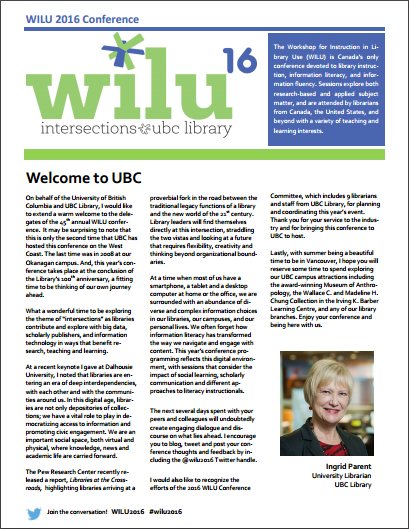|
WILU 2016 is excited to offer two pre-conference sessions. The sessions will occur on Monday, May 30th from 9:00 am – 11:45am. The sessions will include refreshments and lunch. |
Hidden Intersection
Helping Graduate Students Cross the Threshold from Student 2 Scholar using Framework-Driven, Blended Learning IL Interventions
Presenters
Colleen Burgess and Melanie Mills: Research & Instructional Services Librarians at The D.B. Weldon Library, Western University
Learning Outcomes
- Participants will discover and experiment with the bank of IL activities, assets, and assessments available through www.Student2Scholar.ca.
- Participants will design a blended learning, framework-focused IL session using the S2S modules.
- Participants will identify opportunities for blended learning interventions for library instruction at their institutions.
Session Description
Hidden Intersection: Teaching faculty, librarians, and staff in institutions of higher education have now had more than a year to familiarize themselves with and begin to adjust their instruction in response to the Association of College and Research Libraries’ Framework for Information Literacy in Higher Education (ACRL, 2014). But adapting one’s pedagogy from an IL Standards, largely skills-based approach to one grounded in social learning theory is no small feat. Add to this the ever present and pressing challenges of teaching with technology and reaching online students who, increasingly, will never set foot on our campuses, yet alone in our libraries or physical classrooms. In response to this very challenge, a diverse and distributed team of academic librarians and university staff, graduate students and instructional designers, devoted the better part of a year to the design and development of an open access, self-directed series of online modules on the subject of academic literacies and research skills for social science graduate students. Based on ACRL’s Framework for Information Literacy for Higher Education, and acknowledging that research and scholarly development is an iterative process, www.Student2Scholar.ca (S2S) takes a holistic approach in the organization of its content.
Presented in ten modules, including a pre-module on citation management, the framework of S2S is loosely based on a four-phase research process: inquiry & exploration, investigation & organization, analysis & evaluation, and creation & communication. Though www.Student2Scholar.ca may be used as a repository of teaching and learning assets, activities, and assessments from which faculty, librarians, and staff, or graduate students themselves may draw directly, it also provides a case-study in, and an opportunity to facilitate a deliberate departure from IL-standards driven, primarily face-to-face delivered information literacy instruction. In this pre-conference workshop, teaching faculty and instruction librarians and library staff will: (1) observe, role-play, and critique a truncated, ‘mock’ blended-learning IL lesson plan that incorporates S2S in both its design and delivery; (2) be introduced to the sociocultural Technological Pedagogical Content Knowledge (TPACK) framework (Koehler and Mishra, 2009) and engage that frame to reconsider their own pedagogical practice; and finally, (3) exchange workshop-generated library instruction designs, or course/curriculum plans alongside fellow workshop attendees in order to: communicate and share ideas; provide and receive constructive feedback; and leave the session with a working, blended learning, ACRL Framework aligned lesson plan in hand.
Workshop Requirements
Participants will need to bring a laptop or tablet in order to use the S2S software and to conduct collaborative lesson planning. Devices must be capable of connecting to the Internet and have Word or equivalent installed.
Contexts and Connections – FULL
Using ACRL’s Framework to Build Partnerships and Design Learning Activities
Presenter
Dr. Smita Avasthi, Lead Instruction Librarian at Santa Rosa Junior College.
Learning Outcomes
- Use the Framework to build connections with disciplinary faculty.
- Apply disciplinary context(s) to the framework.
- Design a lesson plan to put the framework into practice.
Session Description
ACRL’s framework emphasizes the contextual aspect of information literacy. This new emphasis on context opens the door for librarians to revitalize our instructional approaches by collaborating with other faculty when constructing learning activities; instead of focusing on the mechanics of information retrieval, we can address how information is produced within a specific department or discipline. By using an interdisciplinary lens, we can move beyond demonstrating the use of a database and focus on what it means to conduct research in a specified field or context.
I propose a workshop where librarians discuss each of the six frames as they intersect with a particular discipline or department. For example, the idea that scholarship is a conversation might resonate differently with a history instructor than it would with a nursing teacher. Yet, in either case, a student will need to understand how to participate in this conversation. Thus, the question becomes how can students learn how to engage with and produce the knowledge within their fields? Librarians are uniquely situated to address this question because, unlike other faculty, our purview includes our entire campus; librarians create and maintain sources for all disciplines and, thus, we have unique insights into how topics are treated, how knowledge is produced, and how cutting-edge ideas are communicated within multiple fields. At the same time, many of us liaise and collect materials for a particular subject.
In my workshop, I will divide librarians into six groups, one for each frame, and ask them how this particular frame resonates with the field where they have the most responsibility for collecting materials and instructing students. Once librarians have discussed how all of the frames in relation to a specific field, I would introduce an activity that uses backward design to construct an assignment or learning exercise that would be particularly suitable for that discipline but that can be applied to other classes, as necessary. By the end of the workshops, librarians will have a better understanding of how to use the framework to build partnerships and to rethink information literacy instruction. They will also have interpreted the framework from the perspective of both a scholar and a practitioner. And, by using backward design, they will have produced a lesson plan and will have another strategy for adapting and developing learning activities in a variety of contexts.
Workshop Requirements
No technical requirements. Session is capped at 24 participants.

 Follow
Follow